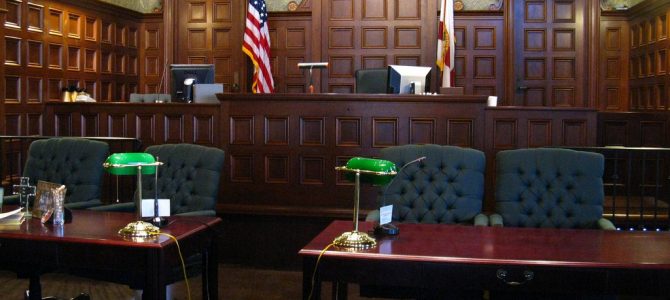
On January 23, President Trump announced his intention to re-nominate 51 judicial nominees that were not confirmed before the end of last year.
In November, now-retired senator Jeff Flake “vowed to oppose the president’s judicial nominees until he gets a vote on a bill to protect Special Counsel Robert Mueller from being fired.” As reported by BuzzFeed’s Zoe Tillman in a tweeted story, “California nominees for the 9th Circuit and district courts aren’t on the renomination list — two sources familiar with the situation say [California Sen. Dianne] Feinstein has been in talks with the White House about reconsidering certain names on that list.”
The report indicates that several controversial nominations, as well as all California nominations, were omitted from the updated list. This matters because one important name, among many, is on that original list that should be carefully considered and recognized: Patrick Bumatay.
Carrie Severino wrote a profile on Bumatay’s career that highlights his experience and positions: He is a 40-year-old lawyer working for the U.S. Attorney’s Office for the Southern District of California for the Department of Justice. He was previously nominated to the Ninth Circuit Court of Appeals in California. He graduated from Yale University and Harvard Law School and is an active member of the Federalist Society.
He is an originalist in the mold of Supreme Court Justice Neil Gorsuch and has worked on the nominations for several Supreme Court judges. If confirmed, he would be the first Filipino-American federal judge and the second openly gay federal judge, the first on the Ninth Circuit.
Patrick Bumatay’s Experience Is Strong
Bumatay currently serves as a counselor to the U.S. attorney general, where he focuses on criminal law issues and policy. He advises the AG on initiatives and policies to combat the national opioid crisis and assists in the oversight of the Drug Enforcement Administration, U.S. Marshals, Bureau of Prisons, and Bureau of Alcohol, Tobacco, Firearms, and Explosives. He also serves as a steering committee member on the U.S. Council of Transnational Organized Crime.
He has worked as senior counsel to Deputy Attorney General Rod Rosenstein (2017-2018) and counsel to the Associate Attorney General Kevin O’Connor (2008-2009). While in private practice with a New York law firm, Bumatay represented an indigent defendant charged with drug trafficking, assisting her in housing and transportation while representing her in court, as well as corporate and individual defendants in criminal and regulatory investigations.
Bumatay has worked as a civil litigator, drafting several motions on behalf of corporate clients. He also managed significant discovery on behalf of clients in civil and regulatory matters. He has argued several cases before courts of appeals and drafted numerous federal appellate briefs. He also authored a petition for certiorari before the U.S. Supreme Court.
Bumatay’s grandfather arrived in California from the Philippines in the 1920s and worked as farm laborer while earning advanced education degrees. His parents are doctors. He and his husband plan a family and he is active in his community. He has been endorsed by the National Filipino American Lawyers Association, the National Asian Pacific Islander Prosecutors Association, and the National Asian Pacific American Bar Association.
Action Speaks Louder than Words
This is all to say that, by any stretch of the imagination, Bumatay should be considered a valuable and diverse asset to the judiciary by the left. So why are Democrats fighting his nomination?
Andrew Chang of San Francisco, California, writing on behalf of the Bay Area Lawyers for Individual Freedom, stated in 2015, “The limited representation of open LGBT judges on the bench affects both LGBTs’ and the public’s perception of LGBTs in society.”
Writing in 2013 for the Huffington Post, Timothy Holbrook, a professor at Emory Law School, stated in an article titled, “Where Are the Gay Federal Appellate Judges?” that, “The conspicuous absence of any openly LGBT nominees to the other federal appellate courts is a concern. It cannot be the case that no qualified LGBT candidates exist.”
The Washington Post criticized Trump for nominating white males to the bench, arguing, “President Trump’s hostility to diversity in his judicial appointments becomes increasingly apparent.” Yet Bumatay faced opposition from Democratic leaders in October 2018 when first nominated. Gregory Angelo, president of Log Cabin Republicans, tweeted:
.@SenFeinstein & @SenKamalaHarris voted against qualified gay nominee @RichardGrenell for Ambassador to Germany.
Now they are already on-record opposing qualified gay nominee Patrick Bumatay for the #9thCircuit.
Even worse? Both are THEIR CONSTITUENTS. https://t.co/lYNh26PqJb
— Gregory T. Angelo (@gregorytangelo) October 17, 2018
Angelo stated in an interview, “Patrick would make an excellent addition to the court…The historic nature of his nomination as an openly gay man adds an additional layer of prestige to what by all counts is an exceptional career in law.”
Hypocrisy By Many On The Left
A spokesperson for California Sen. Kamala Harris stated in reference to the Ninth Circuit nomination that Trump continues to “try to pack the courts with partisan judges who will blindly support the president’s agenda, instead of acting as an independent check on this administration.” USA Today reported that “Bumatay’s nomination angered California’s Democratic Sens. Dianne Feinstein and Kamala Harris, who did not include Bumatay’s name among those they recommended for the vacancies on the 9th Circuit.”
It seems that the only thing holding Democrats back from confirming a highly qualified, diverse nominee is their bias against his perceived politics. Despite his active association with many organizations representing many diverse groups, his work defending members of marginalized communities, and his work across many areas of legal expertise, the one thing that seems to be unacceptable to Democrat senators is his conservative judicial and political worldview.
Unfortunately, it may also be preventing him from being re-nominated under Trump’s renewed attempt to confirm judicial nominees. Trump has stood by many of his controversial selections, and hopefully he will do the same when negotiating for California’s judges. Unlike many others on his list, Bumatay is not cited as expressing controversial views or engaging in anything in his legal or academic career that the left objects to besides his politics. He is simply a conservative, and that seems to be enough for Harris and Feinstein to lobby against him.
Diversity must be more than just superficial characteristics and arbitrary quotas used exclusively to support or oppose politicians or other political narratives. Those who advocate for diversity as a specific attribute cannot betray their commitment simply because an individual does not align with their narrow worldview. Intellectual diversity is just as important as characteristic and experience diversity in all areas of life, but especially on courts.
For the right, the only thing that matters is Bumatay’s character, his morals and ethics, his record, his worldview, and his commitment to unbiased judicial consideration in his work. If the left is going to champion unique perspectives from people coming from different backgrounds and argue that members of underrepresented communities need to be promoted, they cannot discriminate against qualifying candidates who just so happen to think differently than they do.
Bumatay was rightfully nominated the first time around and unfairly denied confirmation due to petty politics, and it is important that our political leaders stand behind their nominations and ensure that highly qualified, ethical, unbiased, and conservative judges are confirmed. I hope President Trump fights for Patrick Bumatay and we see him confirmed. He will be an important conservative voice on the appellate court.









